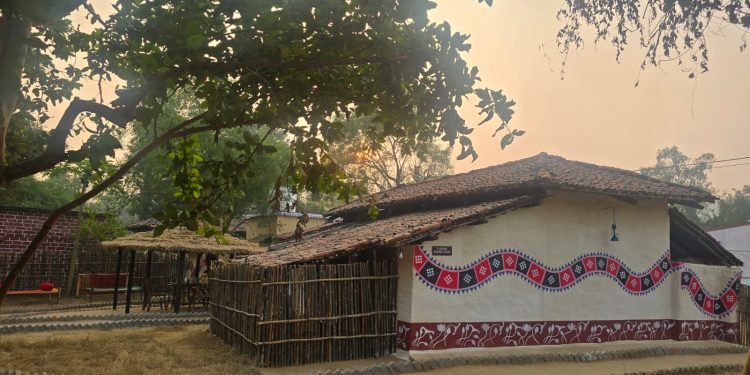Sambalpur: Odisha has stepped into a new frontier of sustainable tourism with the launch of Dhodrokusum Homestay at the foothills of Debrigarh Wildlife Sanctuary, overlooking the tranquil Hirakud Wetlands.
Inaugurated November 25, it is the state’s fi rst homestay facility managed by the Forest department in partnership with local forest-dependent communities. The initiative aims to generate livelihoods while promoting forest and wildlife conservation, offering visitors an immersive experience of nature, culture and local traditions.
The homestay initiative comprises fi ve uniquely designed rooms spread across three local households—Laxmi Homestay (2 rooms), Rebati Homestay (1 room) and Sujata Homestay (2 rooms). Each unit is built using natural materials such as clay, mud, cow dung and husk, blending rustic charm with modern comforts including attached bathrooms, electricity backup and outdoor fi replaces. Guests can enjoy Sambalpuri-inspired décor and handcrafted elements made by local artisans, ensuring an authentic cultural experience.
Also Read: World Tourism Day: This place in India saw most tourists last year; Odisha’s Konark ranked at…
Behind these homestays are inspiring stories of resilience. Laxmi Guru, a widow, opened her homestay to support her daughter’s education. Rebati Bhue, who cares for her ailing husband and two daughters, has created a sustainable source of income through her single room. Sujata Bhoi converted part of her home—once a small shop—into a warm, welcoming space for travellers. All three families have undergone hospitality training and serve authentic local cuisine, enriching the overall guest experience.
Visitors can explore Debrigarh Sanctuary and the Hirakud Wetlands while enjoying activities such as safaris, birding trails, trekking, cycling and guided visits to nearby sites. Rural life here is calm and immersive, offering sunrise and sunset viewpoints, grassland walks and conversations with villagers who share wildlife encounters and local folklore. Safety is well ensured, as many villagers work closely with the sanctuary in roles such as mahouts and members of enforcement squads.
The revenue-sharing model is structured to benefi t both the homestay families and the wider community: 35 per cent goes to the homestay owners, 25 per cent to recurring expenses, 10 per cent to village development, 10 per cent to infrastructure, and 20 per cent to a corpus fund for training and capacity-building. The project was supported by `16 lakh from the Ecotourism Development Committee (EDC) revenue, which was used to rebuild rooms, strengthen waste management systems and upgrade essential amenities.
According to Anshu Pragyan Das, DFO of Hirakud Wildlife Division, Dhodrokusum Homestay is a model that “combines wildlife conservation with local culture, highlighting Odisha’s rich heritage while driving sustainable livelihoods.” With the Supreme Court of India encouraging eco-friendly homestays in wildlife zones, Dhodrokusum is poised to serve as a template for responsible tourism—connecting travellers with nature while supporting forest-dependent communities.
PNN
Orissa POST – Odisha’s No.1 English Daily






































